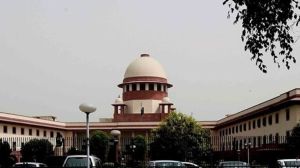Agra creates an island of efficiency for RSS’s jubilee mega show
AGRA, OCT 6: Sprawling over 450 acres, a township has come up on the outskirts of Agra. Away from the congested bylanes of a city bursting...

AGRA, OCT 6: Sprawling over 450 acres, a township has come up on the outskirts of Agra. Away from the congested bylanes of a city bursting at its seams, is a tent city with facilities that have residents of Agra seeing red. In Shastripuram, under the supervision of the local wing of the Rashtriya Swayamsevak Sangh (RSS), water pipelines have been laid, power supply has been established, making the township Agra’s envy and the RSS’s pride.
The occasion is the 75th anniversary of the RSS. Gearing up for the three-day Rashtriya Suraksha Shivir, scheduled to begin on October 13, the Braj wing of the RSS is going all out to make the session bigger and better than any other meet held in the history of the organisation. The focus is going to be on internal security in the face of the ISI threat and growing terrorism.
For three days, swayamsevaks are going to be taught how to combat the threat of terrorism in their districts. From developing their own intelligence units to keeping an eye on Christian and Islamic institutions, the sevaks are going to be taught everything. The bottomline is that after the meet, the RSS should be a lean, mean, fighting force.
And to ensure that the 75,000 swayamsevaks from 25 districts of the Braj region expected to attend the meet are comfortable, the city administration has also been roped in.
In a record time of four months, the wastelands of Shastripuram have been transformed into a self-sufficient township, with the water supply in place, the street lights burning bright and doctors on stand by.
Ashok Jain, treasurer of the BJP’s Braj region and main coordinator of the event elaborates: “There are 40 tent cities that have been constructed and each city will house around 2,000 sevaks. A 100-bed hospital has been constructed at the entrance of the shivir and a 10-bed hospital is outside every city. The water is taken care of and so is the electricity.”
Water pipelines from Agra city have been laid right to the doorstep of the tent cities and will cater to more than 50 per cent of the requirements. The rest will be fulfilled through the bore wells that have also been dug. Thirty-kw generators are on standby and Shastripuram is all set to receive the bigwigs, including Home Minister L.K. Advani, RSS chief K.S. Sudarshan and former chief Rajju Bhaiya.
Meanwhile, a few kilometers down the road, Agra city battles with erratic water supply, bad roads and piling garbage. Though civic administration officials vehemently deny going out of their way to help the RSS organise its do, the people are upset and can’t stop talking about it.
“How can Agra accommodate so many more people,” wonders Shekhar Kumar, the man behind the counter of a grocery store. “The civic administration has not been able to figure out how to manage all the problems of the city, but they have helped the RSS organise their city.”
Jain denies that the local administration played a major role in organising things. “Why should we go to them,” he asks. “We have our swayamsevaks and between us we can manage our own function. But yes, we did ask them to help us with a few things, and that is the case with anybody organising a big event.”
While senior officials of the local administration were not available for comment, their office confirmed that the development of Shastripuram was speeded up following the announcement of the mahashivir. On the drawing board for a long time, it finally took the RSS meet for Shastripuram to be developed.
The agenda
The theme at this meeting is internal security. The threat of the ISI and terrorism in general has got the RSS worried. At the camp, sevaks are going to be given a lesson or two on how to combat terrorism at the local level, without government help.
The speakers
According to the local wing, A.P.J. Abdul Kalam is going to address one of the sessions and Lt Gen J.S. Aurora will be there at the inauguration.
The programme
Inauguration on October 13 at 2.30pm
The camp will be thrown open to the public on October 15 at 2pm





- 01
- 02
- 03
- 04
- 05


























